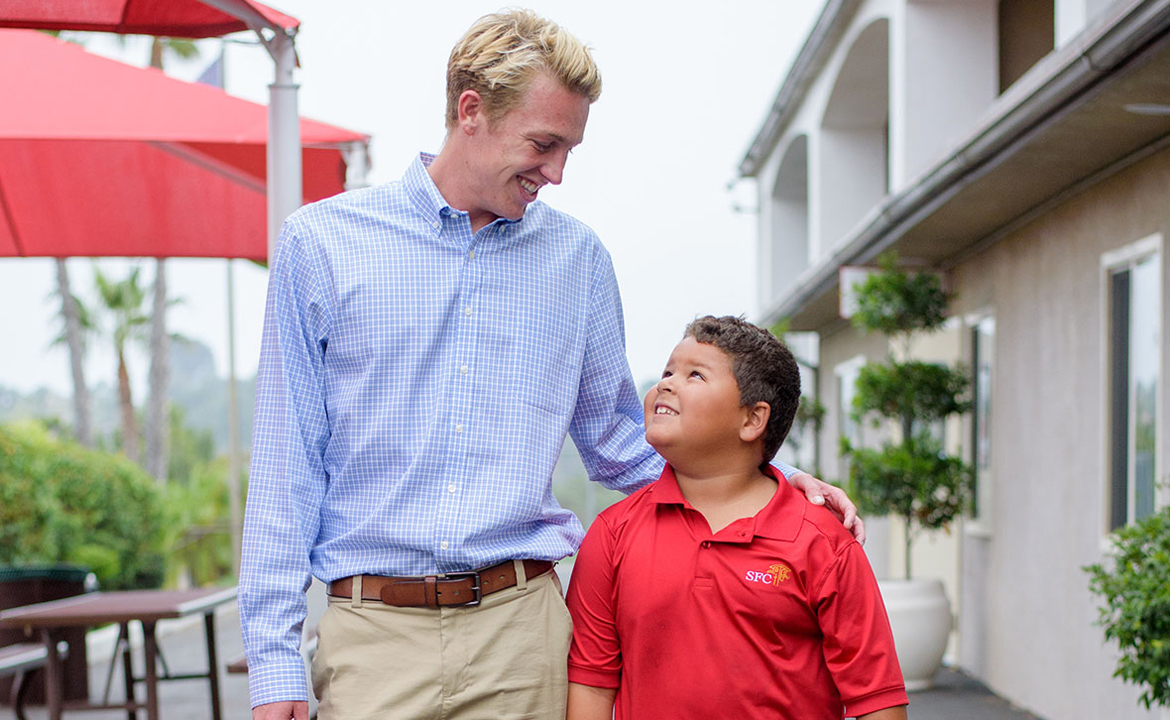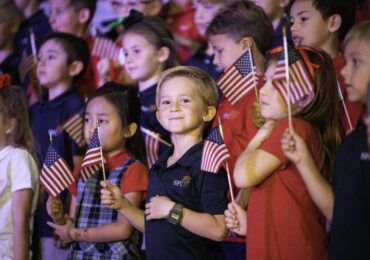EAGLE ESSENTIALS HELPS STUDENTS CONNECT THE DOTS
On a mission to help her K-5 students “connect the dots,” Hannah Park, Elementary School Principal, smiles warmly as she observes children interacting on a busy playground. “Because we are a Christian school, all of us feel a great responsibility to teach our students the value and importance of being quiet influencers on the path to becoming strong, godly leaders. But at such a tender age, this is a pretty big concept to grasp. They are still very literal and compartmentalizing what they learn. The dots are being taught, but if they aren’t drawing lines between the dots, it doesn’t create a complete picture for them,” she says.
After several faculty meetings and discussions, she put together a grassroots group, which included Kim Nicodemus (Kindergarten teacher), Jessica Martin (5th-grade teacher), and Amanda Walker (Elementary School Assistant Principal). Collectively, they began unpacking SFC’s mission statement, looking through the lens of early habit formation and heart transformation. Park says, “We began by asking each other, ‘How can we instill habits of good citizenship and develop godly character, while also helping them understand that salvation comes only from God, not by good works,’ in ways that even a five-year-old will understand?”
The collaborative result was The Eagle Essentials, a character development program for K-5. The overall concept begins with three simple core values (the three R’s) — respect, responsibility, and resourcefulness, based loosely upon “Parenting by the Book” by John Rosemond.
RESPECT
Respect is both given and earned. John Rosemond says, “One must develop respect for others in order to develop self-respect. The young child takes the first step toward self-respect by learning respect for his or her parents. Respect then expands to other adult authority figures, to the immediate social group and eventually, to all mankind. In bestowing respect upon others, respect for self matures.” Applied as lessons in the classroom, Mrs. Nicodemus says, “It starts with something very basic and simple. Our kindergarten students practice respect for authority and their peers by learning to look at someone in the eye when talking, listening before speaking, waiting for their turn to speak or act, and addressing and answering all adults by their surnames.”
RESPONSIBILITY
Learning responsibility extends beyond personal belongings. We are commanded to love one another. This is a very important part of our responsibility to show empathy, compassion, and kindness. Children acquire a sense of social responsibility if they are consistently expected to contribute to their families, classrooms, and other social spheres. Mrs. Park believes that the most powerful way of learning to make good decisions is by being allowed to make small mistakes, experiencing the related consequences, and seeing the adults around you still love you — even when you mess up.
RESOURCEFULNESS
Resourcefulness has become one of the most important skills to teach today. Whether it’s working on a school project or solving a problem on the playground, kids need to learn how to identify their own problems and look for their own solutions independently. Mrs. Nicodemus offers examples of this, saying, “We frequently ask students questions like, ‘What do you think Habits of the Heart The Three R’s: Respect Responsibility Resourcefulness you should do next? How do you think you could solve this problem? What tools do you have that would help you find the answer?’”
Teaching character development includes actionable ways to show, for instance, love, patience, and kindness. Park notes, “We guide our students along in how to actually live it out. We ask them, ‘How can you actually show love in your actions?’ We give them a target group on campus, like the bus driver, or a teacher’s aide. The children come up with their own ideas, like picking up trash without being asked, being extra polite on the bus, or discreetly handing someone a thank you note. We encourage them to become quiet influencers for Christ. I tell my students, ‘Do something good… quietly. But do it because you should, not because you’ll be noticed.’” Sage advice from a wise counselor, indeed.
THE BUILDING BLOCKS
During Preschool, throughout the year, children are taught the Fruit of the Spirit (Galatians 5:22-23) — love, joy, peace, patience, kindness, goodness, faithfulness, gentleness, and self-control — so they can begin allowing these characteristics to inhabit their own personalities. This is a simple precursor to The Eagle Essentials.
In Elementary School, The Eagle Essentials is introduced and reinforced throughout the next six years — establishing godly habits of respect, responsibility, and resourcefulness, while fostering humility and kind hearts.
In Middle School, students are taught that it’s not about being the one who’s always front-and-center or who has the loudest voice, but rather, because they have learned to follow Christ, they must first become humble servant-leaders, displaying great empathy and humility towards others. Students have an opportunity to live this out in tangible applications during their community service projects, retreats, and mission trips.
Finally, as students enter High School, skills taught in the Leadership Academy give way to more tenacious leadership attributes in recognizable, emerging leaders — in academics, athletics, the arts, and during mission trips. Quiet influencers now turn outward, becoming strong godly leaders, because they’ve first learned humility and grace.
The core essential behaviors we value as a Christian community at SFC are not meant to be rules or regulations, but rather the essence of who we are, as we journey to become decent, kind, empathetic people. Character development programs, interlaced with academics, are designed to be the building blocks between grade levels. As students grow and develop, these tools enable quiet influencers to evolve into good citizens, positive contributors, and godly leaders — not because of the programs, but because they have pursued Christ-like habits and behaviors first.






